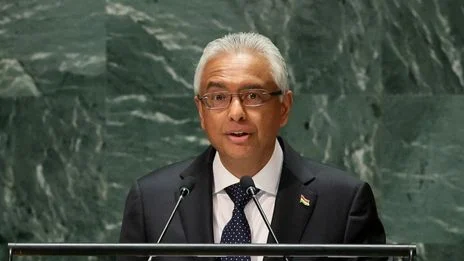Former Prime Minister of Mauritius, Pravind Jugnauth, has been detained in connection with allegations of money laundering, according to the country’s state-run Financial Crimes Commission (FCC). The development marks a significant moment in the political and legal landscape of the Indian Ocean island nation, raising questions about governance, financial oversight, and the rule of law in Mauritius.
Jugnauth, who served as Prime Minister from 2017 until 2023, has been a key figure in Mauritian politics, leading the Militant Socialist Movement (MSM). His tenure was marked by economic reforms and infrastructure projects, but also by allegations of corruption and financial improprieties. The FCC’s announcement that he is under investigation for money laundering underscores the increasing scrutiny of high-level financial transactions in Mauritius, a country known for its offshore banking industry and financial services sector.

The details surrounding the specific allegations against Jugnauth remain undisclosed, but sources close to the investigation suggest that authorities have been tracking financial irregularities involving offshore accounts and undisclosed assets. The Financial Crimes Commission, which was established to combat illicit financial activities, has been intensifying its oversight amid growing concerns over financial transparency in the country.
Observers have noted that Jugnauth’s detention comes at a time of heightened political tensions in Mauritius. The political opposition and civil society groups have long called for greater accountability among public officials, arguing that corruption has weakened democratic institutions and undermined public trust in governance. His arrest is likely to fuel debates over the independence of Mauritius’ legal system, with his supporters arguing that the charges may be politically motivated.
Mauritius, often regarded as a stable democracy in the region, has faced challenges in recent years over issues of financial regulation. The country has been on the radar of international watchdogs, including the Financial Action Task Force (FATF), which in 2020 placed Mauritius on its “grey list” of jurisdictions under increased monitoring for deficiencies in anti-money laundering measures. The government subsequently implemented significant reforms to tighten financial regulations and was removed from the list in 2021. However, concerns remain over the enforcement of these regulations, particularly concerning politically exposed persons (PEPs).
The detention of a former prime minister is an unprecedented event in Mauritius’ modern political history. While previous administrations have faced allegations of corruption, high-profile detentions of senior political figures remain rare. This case is expected to test the country’s judicial processes, particularly in relation to the independence of its financial crime investigations.
Internationally, Mauritius has been positioning itself as a hub for financial services and investment, attracting multinational corporations and offshore business entities. The ongoing case could have implications for investor confidence, particularly if it raises questions about the effectiveness of regulatory frameworks in preventing financial crimes. Global financial institutions and regulatory bodies will likely monitor developments closely to assess the strength of the country’s anti-corruption measures.
Reactions to Jugnauth’s detention have been varied. Political allies within the MSM have called for due process, maintaining that the former prime minister should be presumed innocent until proven guilty. The opposition, however, has seized upon the arrest as evidence of systemic issues within Mauritius’ political and economic structures, calling for deeper institutional reforms.
Legal experts have pointed out that the case could set a precedent for future financial crime investigations involving high-ranking officials. If the charges result in a conviction, it could mark a turning point in how financial misconduct is prosecuted in Mauritius. On the other hand, if the case does not hold up in court, it could raise concerns about the politicisation of law enforcement agencies.
The Financial Crimes Commission has assured the public that its investigation is being conducted in accordance with legal norms and due process. The Commission’s mandate includes investigating money laundering, financial fraud, and corruption, with a particular focus on preventing the misuse of Mauritius’ financial system.
As the case unfolds, it is likely to have significant political ramifications ahead of the next electoral cycle. Jugnauth, despite the allegations, remains a prominent political figure, and the outcome of this case could influence the balance of power in the country’s political landscape.
International organisations, including human rights and transparency groups, are expected to weigh in on the case, urging adherence to fair trial standards and judicial independence. Given Mauritius’ geopolitical importance in the region, particularly as a financial centre, the case could also draw attention from international investors and regulatory bodies.
In the coming weeks, more details are expected to emerge regarding the nature of the financial transactions under scrutiny. For now, the detention of a former head of government represents a pivotal moment in the nation’s political and legal history, with far-reaching implications for governance and financial regulation in Mauritius.